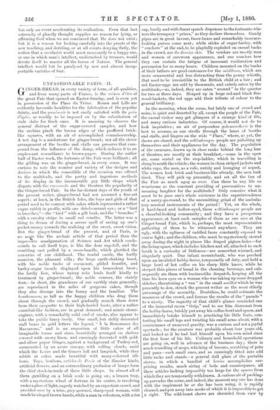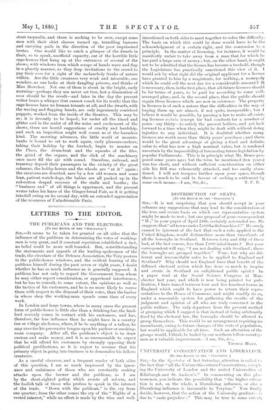UNFASHIONABLE PARIS.—II.
GINGER-BREAD, in every variety of form, of all qualities, and from many parts of France, is the raison d'i;tre of the great Fair that opened on Easter-Sunday, and is even yet in possession of the Place du Trime. Rouen and Lille are evidently favourite localities for the fabrication of the popular dainty, and the gaminerie is not easily satisfied with its pain d'epice, or readily to be imposed on by the substitution of stale slabs for fresh ones. It is amusing to observe the general distrust of the sugar-covered samples, and how the urchins pinch the brown edges of the proffered brick- like squares, with an air of accomplished counaisseurship. A wet day is a misfortune for ginger-bread ; not all the clever arrangement of the booths and stalls can preserve that com- pound from the influence of the damp, which reduces it to an unpleasant resemblance to brown-paper. During the earlier half of Easter week, the fortunes of the Fair were brilliant ; all the gilding was on the ginger-bread, in every sense. It was curious to note the number and variety of the designs and devices in which the comestible of the occasion was offered to the multitude, and the pretty and ingenious methods of its display in the innumerable gay little shops which dispute with the carrousels and the theatres the popularity of the Ginger-bread Fair. In the far-distant days of the youth of the present writer, ginger-bread had not assumed a flue-art aspect ; at least, in the British Isles, the boys and girls of that period used to be content with cakes which represented a rather vague rabbit in profile, with one dried-currant eye ; or a "bird in breeches,"—the " bird " with a gilt beak, and the " breeches " with a cavalry stripe in small red comfits. The latter was a thing to dream of during a severe spell of saving up one's pocket-money towards the realising of the sweet, sweet vision. But the ginger-bread of the present, and of Paris, is no me like 'the archaic article of that period than the impressive amalgamation of Science and Art which conde- scends to call itself toys, is like the dear rag-doll, and the rumbling cart pulled by a cross-handle, which glorified the nurseries of our childhood. The feudal castle, the lordly mansion, the pleasant villa ; the huge earth-shaking beast, with his noble tusks of cocoa-nut, gilded frontlet, and barley-sugar tassels displayed upon his benevolent brow ; the lordly lion, whose tawny robe lends itself kindly to treatment by ginger-bread ; the noble courser, the stately deer,—in short, the graudeurs of our earthly state generally, are reproduced in the miles of gorgeous cakes, though they also diverge into the funny and the familiar. The bonshommes, as tall as the happy children who drag them about through the crowd, and gradually munch them down from their casquette to their high-heeled boots, after a rather cannibal-like fashion, are in great demand ; and mimic steam- engines, with a remarkably solid curl of smoke, also appear to take the public fancy freely. One small, but richly decorated stall bears in gold letters the legend, "A la Renommee des Maccarous," and is an emporium of little cakes of all imaginable forms and sizes, beautifully arranged on shelves covered with snowy linen, and cunningly decorated with gold- and-silver paper fringes, against a background of Turkey-red, surmounted by an azure canopy, with rolling clouds, amid which the Loves and the Graces loll and languish, while they nibble at cakes made beautiful with many-coloured rib- bons. Toys, bonbons, articles de Paris of the flimsier kinds, artificial flowers, and an extraordinary profusion of lamps form the chief stock-in-trade of these little shops. In almost all of them gambling on a brisk scale is going on ; a brazen tray, with a mysterious wheel of fortune in its centre, is revolving under a glare of light, eagerly watched by an expectant crowd, and presided over by a trim, grey-gowned, sharp-eyed woman, with much be-ringed brown hands, while a man in velveteen, with a far
cap, busily and with fluent speech dispenses to the fortunate win- ners the trumpery " prizes," as they declare themselves. Gaudy pipes are in great favour, fusee-boxes and remarkably insecure- looking purses come next; while sticks of sugar-barley, with " crackers " at the end, to be playfully exploded on casual backs
in the crowd, are du demier chic. The vendors are mostly men and women of careworn appearance, and one wonders how they can sustain the fatigue of incessant vociferation and persuasion for so many hours. Children mounted on the backs of their fathers are good customers for the lair/Um/8, which are more ornamental and less distracting than the penny whistle, that used to be irresistible to the British child at a fair ; and red Easter-eggs are sold by thousands, and calmly eaten by the multitude,—as, indeed, they are eaten " around " in the quarter for two or three days. Heaped up in huge red-and-black fire- wood-baskets, the red eggs add their tribute of colour to the general brilliancy.
In the morning, when the scene, but lately one of crowd and noise, is quiet and deserted by all, except the people of the Fair, the casual visitor may get glimpses of a strange kind of life, and many curious industries. Of course, it would not do to look inquisitive ; an air of purposeless gobonaucherie is the best to assume, as one strolls through the lanes of booths and stalls, and lingers on the wide "Place," where, as yet, the shows are closed, and the saltimbangue people are polishing up themselves and their appliances for the day. The population of the caravans, drawn up in close ranks behind the long line of theatres, are mostly at their breakfast,—some in the open air, some seated on the step-ladder, which in travelling is slung beneath the vehicle; the women in clean striped jackets and white caps, the men, as a rule, untidy and lounging of aspect. The women look brisk and business-like already, the men look tired. They will pick up presently, and set all the fun of the Fair as much agog as ever. Can there be any life so wearisome as the constant providing of provocatives to un- meaning laughter for the multitude ? Only conceive what it must be to pass one's whole existence in the superintendence of a merry-go-round, to the unremitting grind of the ambula- tory musical instruments of the period ! Yet, on the whole, if hard-faced and hollow-eyed, these saltimbanque people are a cheerful-looking community ; and they have a prosperous appearance, at least such samples of them as one sees at the Ginger-bread Fair, which is, perhaps, the most representative gathering of them to be witnessed anywhere. They are ugly, with the ugliness of raddled faces constantly exposed to coarse light; and the children, who must be mysteriously stowed away during the night in places like draped pigeon-holes—for the living-space, which includes kitchen and all, attached to each booth is a curiosity of littleness—are somewhat wizened, and singularly quiet. One infant mountebank, who was perched upon an invalided hobby-horse, temporarily off duty, and held a large bowl of hot coffee on his sharp little knees, while he steeped thin pieces of bread in the cheering beverage, and sub- sequently ate them with businesslike despatch, keeping all the time his keen eyes on a woman who was taking up some dropped stitches, threatening a " run " in the small maillot which he was presently to don, struck the present writer as the most elderly personage of the assembly. Dou.btless, he could estimate the resources of the crowd, and foresee the results of the " parade " to a nicety. The sagacity of that child's glance reminded one of the immortal raven "Grip," and to see him dismount from the hobby-horse, briskly put away his coffee-bowl and spoon, and immediately betake himself to practising his little feats, con- torting his small legs and twisting his small arms about, with a countenance of unmoved gravity, was a curious and not a joyful spectacle ; for the creature was probably about four years old, and looked as if he had had himself upon his own mind since the first hour of his life. Culinary and household operations are going on, well in advance of the business day ; there is much trundling of mops, whisking of brooms, scrubbing of pots and pans—such small ones, and so cunningly fitted into odd little racks and stands— a general dull glare of the portable stoves, in which a handful of braise accomplishes sur- prising results, much airing of beds and counterpanes, all these articles looking impossibly too large for the spaces from which they are temporarily withdrawn. A curious air of packing. up pervades the scene, and indeed, the moment any one has done with the implement he or she has been using, it is rapidly cleaned, and put away into nooks of which it is impossible to get a sight. The wild-beast shows are shrouded from view by stout tarpaulin, and there is nothing to be seen, except some men with their shirt sleeves turned up, trundling barrows and carrying pails in the direction of the poor imprisoned brutes. One would like to catch a glimpse of the dwarfs in their, so to speak, unofficial capacity, out of the horrible little cage-houses that hang up at the entrances of several of the shows, with windows from which scraps of hands wave and flap in a ghastly manner, as they drop invitations to the crowd to pay their sous for a sight of the melancholy freaks of nature within. Are the little creatures very weak and miserable, one wonders, as one looks at their dangling prisons, and thinks of Miss Moweher. Not one of them is about in the bright, early morning—perhaps they are never set free, lest a diminution of sous should be the result—and later in the day the present writer hears a whisper (but cannot vouch for its truth) that the cage-houses have no human tenants at all, and the dwarfs, with the waving and flapping hands, are only ingeniously contrived puppets, worked from the inside of the theatres. This may be so ; it is devoutly to be hoped ; for under all the tinsel and glitter and in the midst of all the noise and excitement of the shows, there are horrid suggestions of cruelty and. hardship, and such an imposition might well count as of the harmless kind. The morning advances, the little world of mounte- banks is bound to set to work again, early pleasure-seekers, taking their holiday by the forelock, begin to muster on the Place, the drum-beat and the squeaks of the fifes, the grind of the organs, and the click of the machinery once more fill the air with sound. Omnibus, railroad, and tramway deposit their passengers in the vicinity of the great columns, the hobby-horses and the wheels are "at it" again ; the caravans are deserted, save by a few old women and some lean, patient watch-dogs, the babies are all packed up in the red-cotton draped recesses of the stalls and booths ; the "business end" of all things is uppermost, and the present writer takes his leave of the Ginger-bread Fair, as it is getting into full swing on its second day, with an extended appreciation of the resources of Unfashionable Paris.



































 Previous page
Previous page